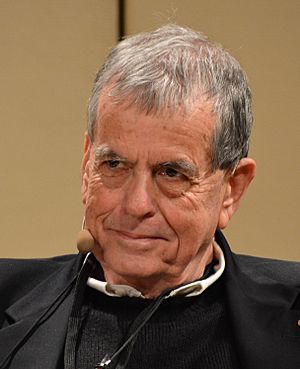Aaron Ciechanover facts for kids
Quick facts for kids
Aaron Ciechanover
ForMem, NAS
|
|
|---|---|
| אהרן צ'חנובר | |

Ciechanover in 2014
|
|
| Born | October 1, 1947 |
| Education | Hebrew University of Jerusalem (MS, MD) Technion – Israel Institute of Technology (D.Sc) |
| Known for | Ubiquitin-mediated protein degradation |
| Spouse(s) | Menucha Ciechanover |
| Awards | Nobel Prize in Chemistry (2004) Israel Prize (2003) EMET Prize (2002) |
| Scientific career | |
| Fields | Biology |
| Institutions | Technion, Israel NCKU, Taiwan |
Aaron Ciechanover is a famous Israeli scientist who won the Nobel Prize in Chemistry. He is known for discovering how our body's cells clean up and recycle old or damaged proteins. This process is super important for keeping our cells healthy and working correctly!
Contents
Biography
Early Life and Education
Aaron Ciechanover was born in Haifa, which was then called British Mandate of Palestine, on October 1, 1947. His parents were from Poland and moved to Israel in the 1920s.
He studied science and medicine in Israel. He earned his master's degree in science in 1971 and became a medical doctor in 1974. He then received his Ph.D. in biochemistry in 1981 from the Technion – Israel Institute of Technology in Haifa. After that, he did more research at MIT in the United States from 1981 to 1984.
His Work Today
Today, Professor Ciechanover is a very respected research professor at the Technion – Israel Institute of Technology in Israel. He is also a member of several important science groups around the world, like the Israel Academy of Sciences and Humanities and the United States National Academy of Sciences.
In 2018, he helped open a special research center in China called the Ciechanover Institute of Precision and Regenerative Medicine. This center focuses on new technologies in medicine.
Nobel Prize Discovery
Aaron Ciechanover is one of Israel's first scientists to win a Nobel Prize. He received the Nobel Prize in Chemistry in 2004. He shared the prize with Avram Hershko and Irwin Rose.
They discovered how cells use a small protein called ubiquitin to mark other proteins that are old or damaged. Once marked, these proteins are then broken down and recycled by the cell. Think of ubiquitin as a tiny "tag" that tells the cell's recycling system which proteins to get rid of. This discovery helps us understand how our bodies stay healthy and how diseases like cancer, muscle problems, and nerve diseases can develop.
Lectures and Talks
Professor Ciechanover has traveled to many places to share his knowledge. For example, he was a guest lecturer at the Yerevan State Medical University in Armenia in 2010. He also gave a lecture at the Pyongyang University of Science and Technology in North Korea in May 2016.
Helping Companies with Science
Aaron Ciechanover has also worked with several companies, advising them on their scientific research. He has been on the scientific advisory boards of companies like Rosetta Genomics and Protalix BioTherapeutics. This means he helps guide their science projects.
He is also part of the advisory board for Patient Innovation, which is a free website where patients and caregivers can share their own ideas and inventions to help manage different diseases.
Awards and Honors
Professor Ciechanover has received many important awards for his scientific work:
- In 2000, he received the Albert Lasker Award for Basic Medical Research.
- In 2003, he was given the Israel Prize, which is one of Israel's highest honors, for his work in biology.
- In 2004, he won the Nobel Prize in Chemistry for his groundbreaking discovery about protein recycling in cells.
- In 2005, he received the Golden Plate Award from the American Academy of Achievement.
- In 2006, he was awarded the Sir Hans Krebs Medal.
- In 2009, he received an Honorary Doctorate from the University of Cambodia.
- In 2011, he was awarded the Humboldt Prize.
- In 2016, he became a member of the German Academy of Sciences Leopoldina.
See also
 In Spanish: Aaron Ciechanover para niños
In Spanish: Aaron Ciechanover para niños
- List of Israel Prize recipients
- List of Israeli Nobel laureates
- List of Jewish Nobel laureates
 | Ernest Everett Just |
 | Mary Jackson |
 | Emmett Chappelle |
 | Marie Maynard Daly |

